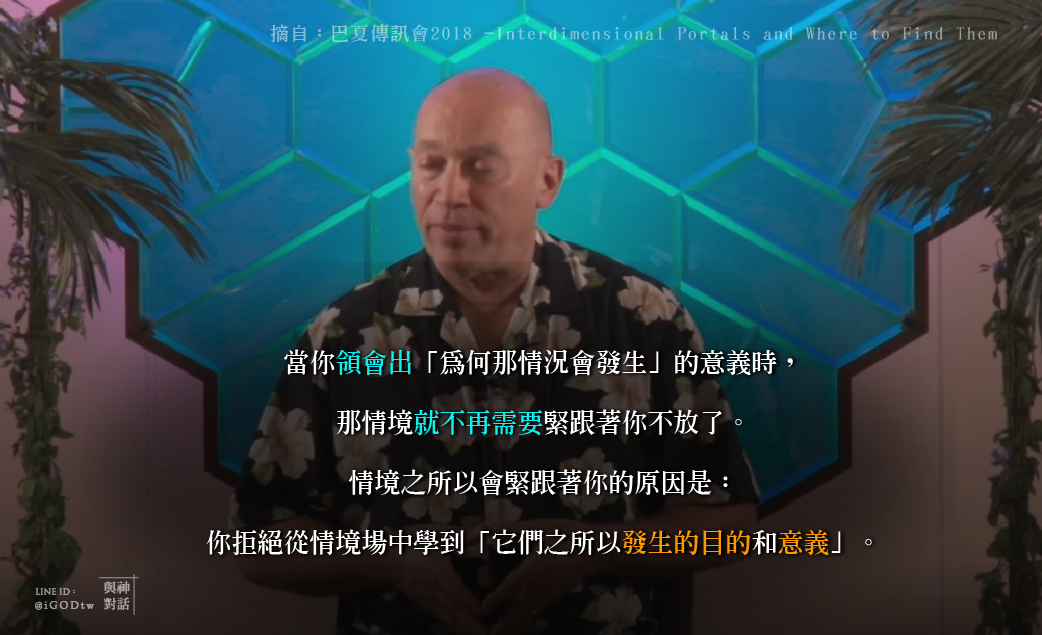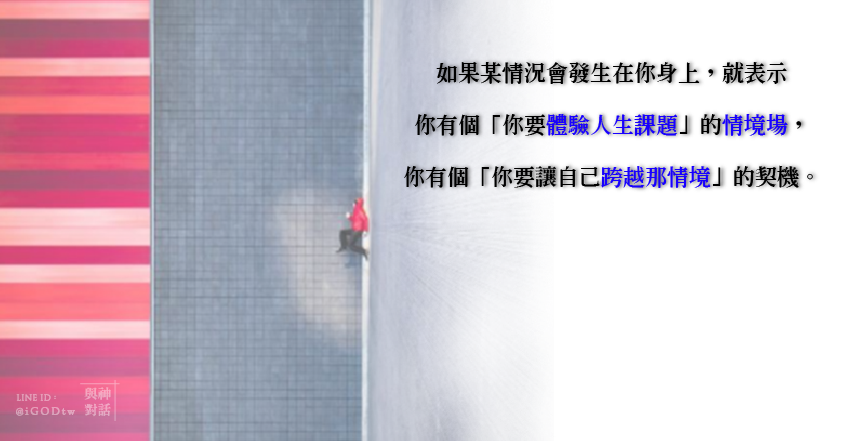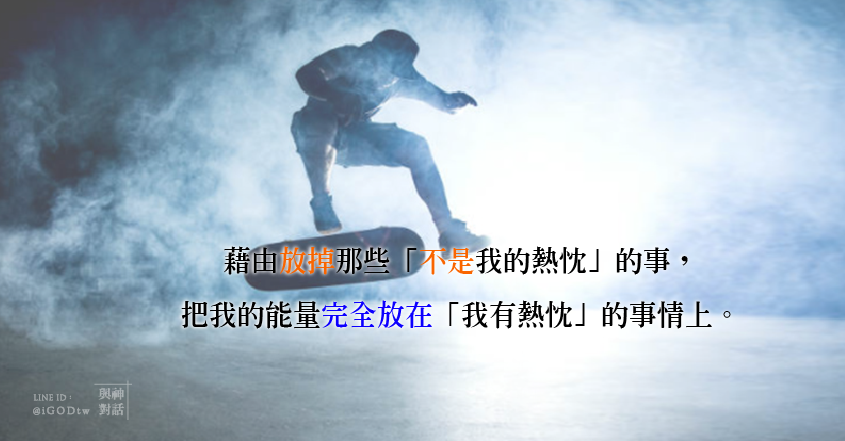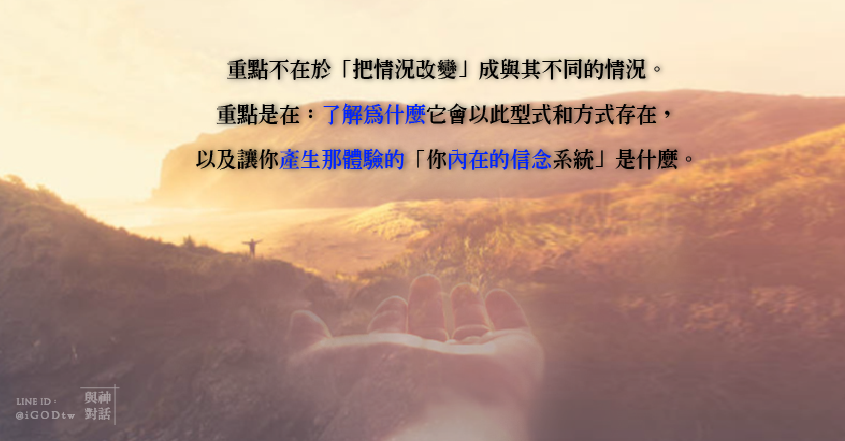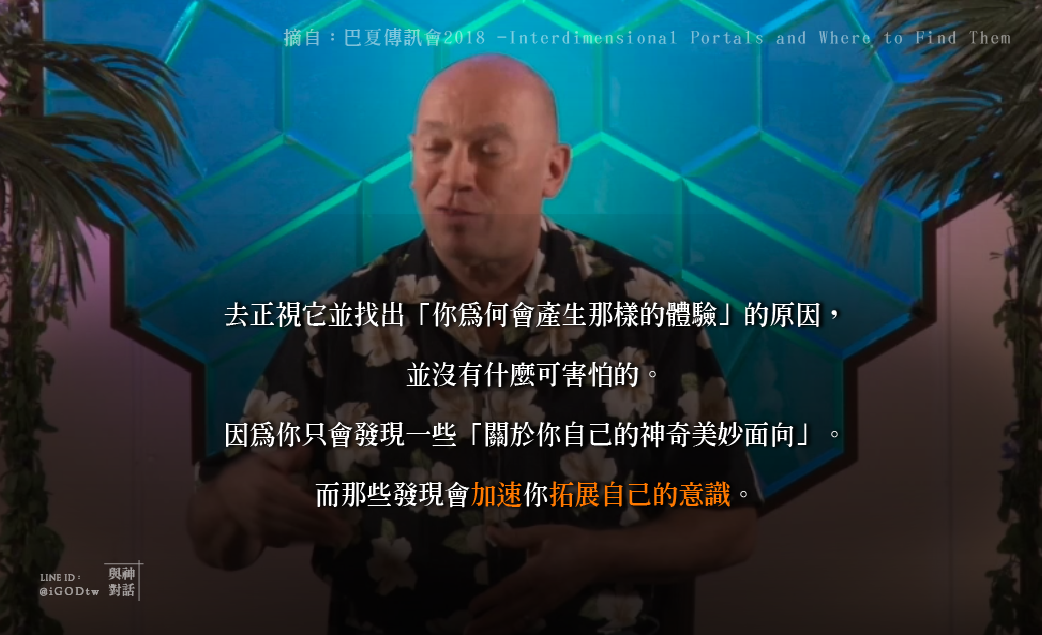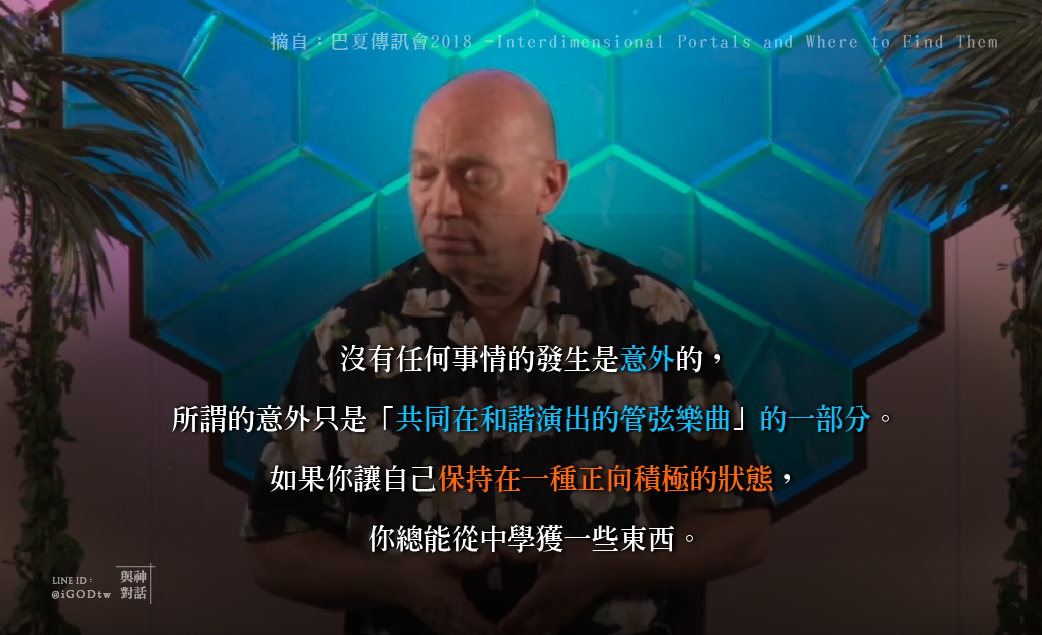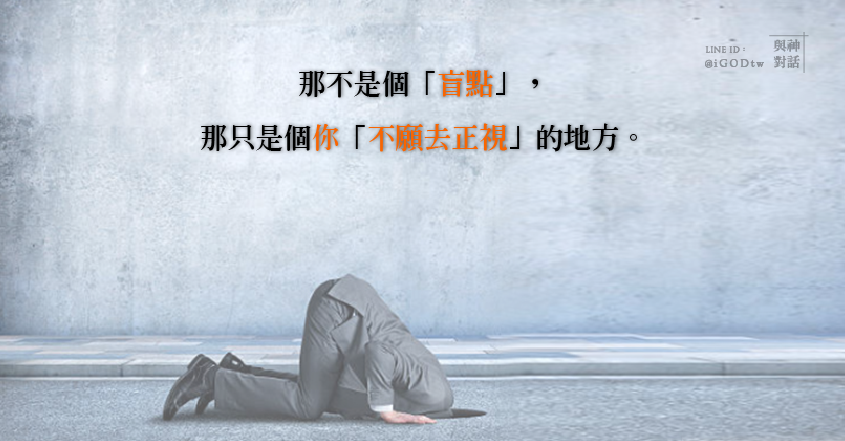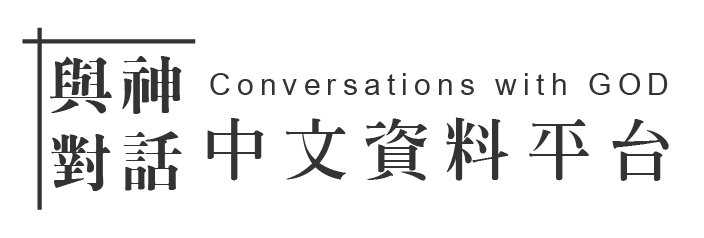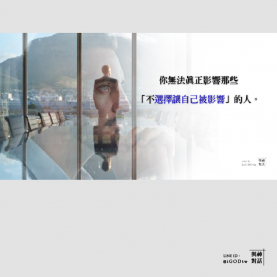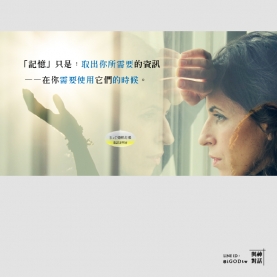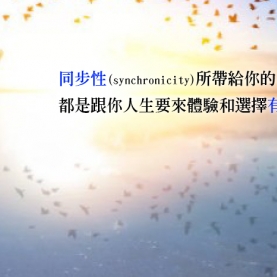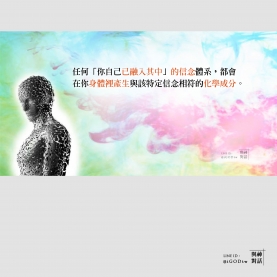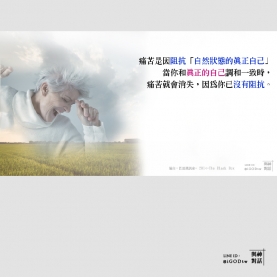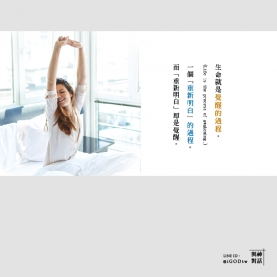巴夏精選短片(6分50秒):【如何跨越和脫離長期困擾我的情境場?】Bashar342
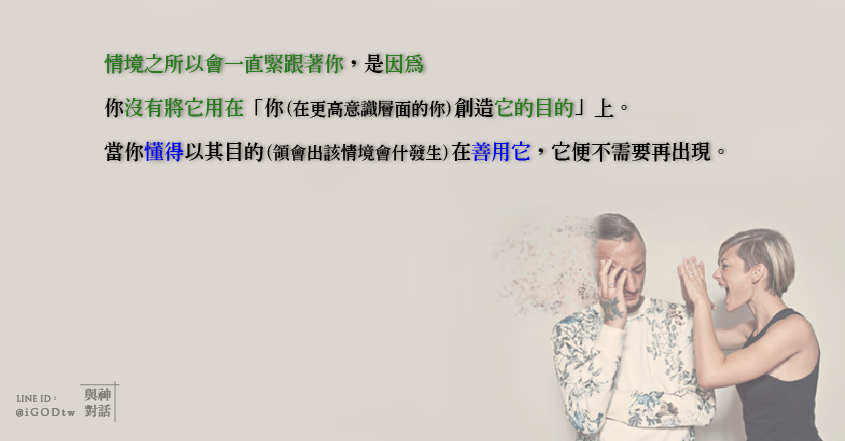
Q: 所以,我的最後一個問題是,我正在了解「一切都是選擇」。
Q: 呃… 我聽你說過很多關於「信念如何影響我們的生活」,例如,當你提到疾病的問題,對我來說,我患有疾病或很不舒服…
Q: You know, it's not my preference, I mean, I really wish I could just switch to a parallel reality where it's like…
Q: 你知道,這不是我喜歡的,我的意思是,我真的希望自己能轉換到一個不同的平行實相,那裡沒有像…
Well, the idea is, if it's happening, there is something for you to get out of it.
好的,這概念是:如果某情況會發生在你身上,就表示你有個「你要讓自己跨越那情況」的契機(你有個「你要體驗人生課題」的情境場)。
So when you learn the lesson of why that's there, then it will no longer need to stick around.
所以,當你領會出「為何那情況(人生課題)會發生」的意義時,那情境就不再需要緊跟著你不放了。
Things only stick around when you refuse to learn the lesson of why they are happening.
情境之所以會緊跟著你的原因是:你拒絕從情境場中學到「它們之所以發生的目的和意義」。(所有關係和情境場的目的,都是為了提供「讓人們得以展現更高版本的自己」的機會。)
Q: Yeah. So, maybe that’s why I'm stuck.
Q: 對啊,所以,或許這就是為何我還被困住的原因。
Well, it's not stuck. You're thinking that it's not important for you to investigate why that's there, but it is.
重點不在你被困住。重點是在你認為「找出為何那情境會緊跟著你的原因」對你並不重要,但它是重要的。
It's not about changing into something else.
重點不在於「把情況改變」成與其不同的情況。
It's about understanding why it exists as it does, and what the belief systems are within you that are generating that experience.
重點是在:了解為什麼它會以此型式和方式存在,以及讓你產生那體驗的「你內在的信念系統」是什麼。
When you use it up, it will no longer be there. It only sticks around when you don’t use it for the purpose you create of it.
當你以其目的(領會出該情境為什發生)在善用它,它便不再出現。情境之所以會一直緊跟著你,是因為你沒有將它用在「你(在更高意識層面的你)創造它的目的」上。
To bring your attention to something you need to pay attention to about how you are creating that kind of experience,
要讓自己注意到某些「你需要關注你是如何創造出那樣的體驗」的方法,
find the belief systems that underlie it; realize that they don't belong to you, and never did that they're irrelevant for you, and let them go.
就是去找出「產生該體驗背後的信念系統」,去認識和領會那些「不屬於你的信念」,而且它們從來都不屬於你,也與你無關,並放掉它們。
Then you will not be dis-eased with yourself.
如此一來,你就不會再跟自己過不去、不會再不舒服了。
Q: So…, I don't know. I understand that, I guess on a conceptual level…
Q: 所以說…呃…我猜…在概念層次上我懂…
Do you?
你有懂嗎?
Q: I feel like that answer, I get a lot of frustration from that, because I feel like there's something I'm not seeing. Sometimes it's like a blind spot or something. And I…
Q:我覺得那答案,我從中感受到很多沮喪的情緒,因為我覺得有些「我看不到」的東西。有時候就像「盲點」或之類的東西。而我…
But it's not a blind spot, you just refuse to look there.
但那不是個「盲點」,那只是個你「拒絕去正視」的地方。
Because you're afraid to look there. Because the negative belief is making you believe that you shouldn't look there or something worse will happen.
因為,你害怕去正視那些地方。因為負面信念讓你相信了「你不應該去正視那些地方,否則更糟的事情會發生」。
You need to ignore the negative belief. You need to see it as a trick, as a smoke and mirrors.
你需要去忽視那些負面信念。你需要將負面信念視為一種把戲、視為煙霧和鏡子(在反映給你看,以讓你越來越認識真正的自己的鏡子)。
You need to see through the illusion that the negative belief is pushing on you, because it’s simply attempting to preserve itself.
你需要看透(看見)那「負面信念正在對你施壓」的幻覺,因為那只是負面信念用來維持它自己(可持續控制你)的方式。
So, there’s nothing to be afraid of in looking to find out why you may have generated that experience.
所以,去正視它並找出「你為何會產生那樣的體驗」的原因,並沒有什麼可害怕的。
You will only find some wonderful discovery about yourself that will allow you to expand.
因為你只會發現一些「關於你自己的神奇美妙面向」,而那些發現會讓你拓展自己(加速擴展自己的意識,以體驗和成為「更高版本的自己」)。
That's all you will ever find if you really look. There is nothing to be afraid of in looking,
那就是「如果你真的去正視它」時,所有你會發現的東西。去正視它並沒有什麼好害怕的。
even though the negative belief may wish to make you believe that there is.
即使你的負面信念會希望你相信「那很可怕」。
You have to know that that's a trick, yes?
你必須了解那只是個「負面信念的把戲」,明白嗎?
Q: Yeah.
Q: 沒錯。
May I ask you a question?
我可以問你一個問題嗎?
Q: Yeah.
Q: 好。
Do you believe you are worthy of your life, or do you feel unworthy?
你相信自己的生命是有價值的,還是沒有價值?
Q: I want to say I feel worthy.
Q: 我想說「我覺得我是有價值的」。
Say again.
再說一次。
Q: I want to say that I feel worthy.
Q: 我想說,我覺得我的生命是有價值的。
You want to say that your feel worthy, which means you don't.
「你想說」你覺得自己是有價值的,這表示「你尚處於」認為自己的生命沒有價值的信念狀態。
Q: I guess so.
Q: 我猜應該是這樣吧。
Correct?
對嗎?
Q: Yeah, I guess so.
Q: 對,我猜應該是這樣。
All right. So, what belief system do you have that you're holding onto that says you are not worthy of living a ecstatic life?
好的。所以說,你緊抓著的信念系統是什麼呢?是什麼樣的信念系統在告訴你:「你不值得過一種狂喜快樂的人生」?
Why do you believe that you deserve to feel unworthy?
你為什麼要相信「自己不值得」?
What are you afraid will happen if you allow yourself to feel completely worthy?
要是你允許自己「覺得自己充滿價值」的話,什麼是你擔心會發生的事呢?
Q: I think I'm afraid of realizing my greatness or like my bigness.
Q: 我想,我害怕了解「自己的偉大或自己的強大」是真實的。
Because what do you think will happen if you do? What do you afraid will happen if you realize your greatness?
因為如果你確實是那樣(偉大或強大)的話,你認為會發生什麼? 如果你認識到自己的偉大,你害怕會發生什麼?
Q: I think that I'll get, like somehow, I'll fail at that, or like I'll get big and doing my passion, having all this great stuff happening for me, and then shoe's gonna drop.
Q: 我想我不知怎麼地總會失敗,或是我一開始興致勃勃充滿熱忱,發生很多好事在我身上,但之後這些美好的事就離我而去(Shoe drop 意指順遂的日子結束了)。
Well, maybe you shouldn't wear shoes then.
那麼,也許你一開始就不應該穿那雙會脫落的鞋(Shoe drop 直譯為鞋底脫落的鞋子)。
But you understand that that's not a fact, it's just a belief.
但你必須明白:那不是「事實」,那只是個「信念」。
Because certainly, as you live your passion, one of the things your passion does is bring your attention to things that are not your passion, but that's not a shoe dropping. That's part of the process of discovering more of your passion. To discover things that are not your passion is part of your passion.
因為,的確,當你跟隨你的熱忱行事(活出你的熱忱),你的熱忱確實會帶領你注意到的事情之一就是「讓你明白什麼不是你有熱忱的」事,但那不是鞋子脫落(美好事情離你而去)。那是讓你「發現更多自己的熱忱」的過程。「發現哪些不是你有熱忱的事」也是「(更清楚什麼是)你的熱忱」的一部分。
So, let that be part of the process, and be okay with what comes to your attention that is not your passion. That's not a shoe dropping. You don't have to define it that way.
所以,讓它成為過程的一部分,並對於那些你注意到「不是你熱忱的事」沒問題。這不是美好事情離你而去,你不必那樣定義它。
By defining it that way, you're experiencing it as a negative.
若你以那種方式定義它,你將體驗它為一種負面的情境。
Define it as positive: Oh, my passion just brought my attention to something that is not my passion, oh goodie.
將它定義為正向的情境(,例如):喔,我的熱忱剛讓我注意到「那不是我有熱忱要做的事」,喔,這太好了。
Now I can clarify by letting that go and adding that energy to my overall passion.
現在我可以藉由放掉那些「不是我的熱忱」的事,把我的能量完全放在「我有熱忱」的事情上。
So thank you passion for bringing my attention to something that is not my passion.
所以,感謝你,熱忱,感謝你帶領我注意到那些「不屬於的我熱忱」的事情。
Yes?
了解嗎?
Yeah.
是的。
It's a very different way of looking at it, than thinking “Oh, the shoes’gonna drop, and everything is going to fall apart. Oh my goodness gracious.”
相較於認為:「喔,美好事情就要離我而去了,一切將要崩潰。 喔,我的天啊。」,這是一種看待情境非常不同的方式。
You're the one setting yourself up for that pain, by defining it as something wrong when it happens,
你正是那「讓自己置身於那痛苦中」的人,(因為)當事情發生時,你藉由將它定義為不對的東西(負面的情境),
instead of exploring with fascination and curiosity, “Why it happened?” and “What you can get out of it.”, “What you can learn from it.”
而不是以充滿好奇及讓人著迷的方式在探索,並問自己:「為什麼會發生這樣的事?」、「我能從中領會出什麼?」、「我可以從中學到什麼?」。
Nothing happens by accident, it's an orchestration.
沒有任何事情的發生是意外的,它(所謂的意外)只是「共同在和諧演出的管弦樂曲」的一部分。
There is always something you can learn if you stay in a positive state.
如果你保持在一種正向積極的狀態,你總能從中學獲一些東西。
Is this helping at all?
這解說是否對你有點幫助?
Q: Yeah. And I, you know when you're speaking, I feel I just got the message of… I realize that I'm afraid of experiencing pain and but in…
Q: 有的。而我,你知道,你在講解的時候我感受到的信息是,我意識到「我害怕經歷痛苦」但是在…
Yes, but you know what? But you know what? That's a lie. Do you know why it's a lie? Because you're creating pain with yourself right now.
是的,但你知道嗎?但你了解嗎?那是一個謊言。你知道為什麼那是個謊言嗎? 因為此刻,你正在為你自己製造痛苦。
Q: Yeah, that's so ironic.
Q: 是的,這真的很諷刺。
That's the paradox, yes.
這就是你的矛盾點,沒錯吧。
So obviously you're not afraid of creating pain, otherwise you wouldn't be holding onto beliefs that allow you to feel pain.
所以,很顯然地,你並不是害怕創造痛苦,否則你就不會堅持你的信念而讓自己感到痛苦。
So?
了解嗎?
Q: That's awesome.
Q: 這個觀點真的太棒了。
There you go. So now that you understand that you're not afraid of pain, use the pain; use the beliefs in a way that allows you to be pain free, by accepting the fact that at first, you're actually generating pain for yourself by your own choice.
這就對了。所以現在你明白「你並不害怕痛苦」,因此,去善用痛苦,以一種讓你沒有痛苦的方式去運用你的信念:首先,以接受「你實際上是在自己的選擇下製造痛苦」的事實為第一步。
Then you're in control. Because if it's not by your choice, you can't change it.
於是,你就拿回了情境的掌控權。因為,若不是你所做的選擇,你會無法改變它。(因為那是你做的選擇,所以你可以改變它。)
So own it, acknowledged that you're creating the pain, obviously. Because you're holding onto beliefs that make your life feel painful.
And then ask yourself “Well, do I really need this anymore? Is there something else to learn from this other than learning to stop doing it?”
所以,擁有那選擇,承認很顯然地是你在創造那痛苦,因為,是你所堅持抓著的信念在讓你的生活感到痛苦。
然後自問:「我真的還需要這樣的信念嗎?除了學會不再這樣做之外,還有什麼是我可以從中學獲的?」
And then stop doing it. And live life in a different way, and learn things in a way that isn't painful, yes?
然後,不再以那信念模式製造痛苦了,要以不同的方式過生活,以不製造痛苦的方式學習新觀念。了解嗎?
Q: Yes.
Q: 了解。
Is this helping?
這解說有幫助嗎?
Q: Very much so, thank you.
Q: 有非常大的幫助,謝謝你。
